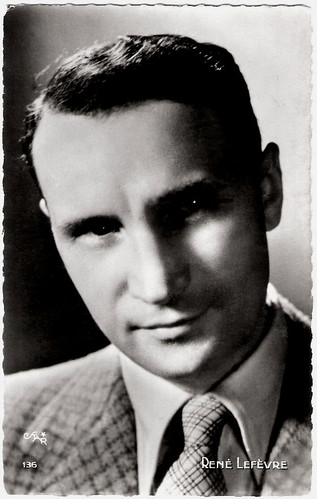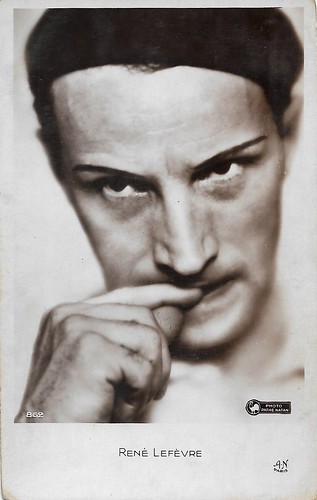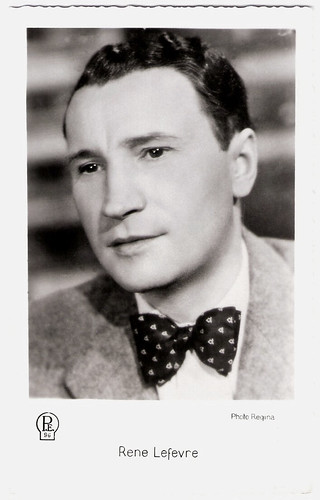French actor René Lefèvre (1898-1991) became a star as the working class hero of the classics Le Million (1931) and Le Crime de Monsieur Lange (1936). He was a ‘quadruple threat’ man: he was also active as a writer, producer and director.

French postcard by Éditions Chantal (EC), Paris, no. 102.

French postcard by Editions A.N., Paris, no. 770. Photo: Studio Lorelle / Film Pathé-Natan.
René Lefèvre was born as René Paul Louis Lefèbvre in Nice, France, in 1898. He started his career on the stage of the Comédie des Champs-Élysées in Paris in plays by Marcel Achard and Prosper De Mérimée.
His mentor was the famous actor Louis Jouvet. The stage success of 'Knock', the play by Jules Romains, led to his film debut in the film adaptation Knock, ou le triomphe de la médecine/Knock or the Triumph of Medicine (René Hervil, 1925).
He often played the ‘bon garçon’, the naive but spirited guy, sometimes melancholical, but also good-hearted, gay and generous. In the following years, he developed this character in films like Le tourbillon de Paris/The Maelstrom of Paris (Julien Duvivier, 1928) and Le chemin du paradis/The Road to Paradise (Wilhelm Thiele, Max de Vaucorbeil, 1930).
Lefèvre perfected it in the successful musical comedy Le Million/My Friend Victor (René Clair, 1931), about a missing winning lottery ticket and a long line of people trying to get it.
He was also seen to good advantage in the title role of another classic, Le Crime de Monsieur Lange/The Crime of Monsieur Lange (Jean Renoir, 1936), based on a script by Jacques Prevert. Lefèvre plays a 'nebbish' who clerks for a penny-press publisher (Jules Berry) by day and writes feverish potboilers about a Western hero named Arizona Jim by night. His boss discovers his secret and immediately starts exploiting it. Life sublimely imitates pulp fiction and vice versa.

French postcard by P.C., Paris, no. 73. Photo: G.L. Manuel Frères, 63. René Lefèvre wearing the outfit from Le crime de M. Lange/The Crime of Monsieur Lange (Jean Renoir, 1936).

French postcard by Editions P.I., Paris, no. 63.

French postcard by Editions P.I., Paris, no. 136. Photo: Star.
As a director, René Lefèvre started as an assistant to Julien Duvivier. Lefèvre directed himself the musical Opéra-Musette (1942), co-directed by Claude Renoir. For this film, he also wrote the dialogues as he did for more films, including La carcasse et le tord-cou/The Carcass and the Weithing Neck (René Chanas, 1948), starring Michel Simon, and Sous le ciel de Paris/Under the Paris Sky (Julien Duvivier, 1951).
In 1952, he left films cold to concentrate on other pursuits. Five years later, he returned before the cameras as a character actor in the excellent war drama Celui qui doit mourir/He Who Must Die (Jules Dassin, 1957).
He remained active for the next two decades. Lefèvre was also the author of several novels, some of which were adapted for the screen, including Rue des Prairies/Rue de Paris (Denys de La Patellière, 1959), starring Jean Gabin.
His later films as an actor include the thriller Le Doulos/The Finger Man (Jean-Pierre Melville, 1962) starring Jean-Paul Belmondo, the historical romance Angélique et le roy/Angelique and the King (Bernard Borderie, 1966), and the war thriller Un homme de trop/Shock Troops (Costa Gravas, 1967).
In the 1970s and the early 1980s, he also worked for TV. His last film was the comedy Un oursin dans la poche/A Sea Urchin in the Pocket (Pascal Thomas, 1977) with Darry Cowl. René Lefèvre died in his birthplace, Nice, in 1991.

French postcard by A.N., Paris, no. 862. Photo: Pathé Natan.

French postcard by Photo Edition, no. 96. Photo: Photo Regina.
Sources: Hal Erickson (AllMovie - Page now defunct), Yves Laframboise (Pensée de la semaine - French), Richard T. Jameson (Amazon.com - Page now defunct), Wikipedia (French) and IMDb.
This post was last updated on 14 March 2025.

French postcard by Éditions Chantal (EC), Paris, no. 102.

French postcard by Editions A.N., Paris, no. 770. Photo: Studio Lorelle / Film Pathé-Natan.
The bon garçon
René Lefèvre was born as René Paul Louis Lefèbvre in Nice, France, in 1898. He started his career on the stage of the Comédie des Champs-Élysées in Paris in plays by Marcel Achard and Prosper De Mérimée.
His mentor was the famous actor Louis Jouvet. The stage success of 'Knock', the play by Jules Romains, led to his film debut in the film adaptation Knock, ou le triomphe de la médecine/Knock or the Triumph of Medicine (René Hervil, 1925).
He often played the ‘bon garçon’, the naive but spirited guy, sometimes melancholical, but also good-hearted, gay and generous. In the following years, he developed this character in films like Le tourbillon de Paris/The Maelstrom of Paris (Julien Duvivier, 1928) and Le chemin du paradis/The Road to Paradise (Wilhelm Thiele, Max de Vaucorbeil, 1930).
Lefèvre perfected it in the successful musical comedy Le Million/My Friend Victor (René Clair, 1931), about a missing winning lottery ticket and a long line of people trying to get it.
He was also seen to good advantage in the title role of another classic, Le Crime de Monsieur Lange/The Crime of Monsieur Lange (Jean Renoir, 1936), based on a script by Jacques Prevert. Lefèvre plays a 'nebbish' who clerks for a penny-press publisher (Jules Berry) by day and writes feverish potboilers about a Western hero named Arizona Jim by night. His boss discovers his secret and immediately starts exploiting it. Life sublimely imitates pulp fiction and vice versa.

French postcard by P.C., Paris, no. 73. Photo: G.L. Manuel Frères, 63. René Lefèvre wearing the outfit from Le crime de M. Lange/The Crime of Monsieur Lange (Jean Renoir, 1936).

French postcard by Editions P.I., Paris, no. 63.

French postcard by Editions P.I., Paris, no. 136. Photo: Star.
Other pursuits
As a director, René Lefèvre started as an assistant to Julien Duvivier. Lefèvre directed himself the musical Opéra-Musette (1942), co-directed by Claude Renoir. For this film, he also wrote the dialogues as he did for more films, including La carcasse et le tord-cou/The Carcass and the Weithing Neck (René Chanas, 1948), starring Michel Simon, and Sous le ciel de Paris/Under the Paris Sky (Julien Duvivier, 1951).
In 1952, he left films cold to concentrate on other pursuits. Five years later, he returned before the cameras as a character actor in the excellent war drama Celui qui doit mourir/He Who Must Die (Jules Dassin, 1957).
He remained active for the next two decades. Lefèvre was also the author of several novels, some of which were adapted for the screen, including Rue des Prairies/Rue de Paris (Denys de La Patellière, 1959), starring Jean Gabin.
His later films as an actor include the thriller Le Doulos/The Finger Man (Jean-Pierre Melville, 1962) starring Jean-Paul Belmondo, the historical romance Angélique et le roy/Angelique and the King (Bernard Borderie, 1966), and the war thriller Un homme de trop/Shock Troops (Costa Gravas, 1967).
In the 1970s and the early 1980s, he also worked for TV. His last film was the comedy Un oursin dans la poche/A Sea Urchin in the Pocket (Pascal Thomas, 1977) with Darry Cowl. René Lefèvre died in his birthplace, Nice, in 1991.

French postcard by A.N., Paris, no. 862. Photo: Pathé Natan.

French postcard by Photo Edition, no. 96. Photo: Photo Regina.
Sources: Hal Erickson (AllMovie - Page now defunct), Yves Laframboise (Pensée de la semaine - French), Richard T. Jameson (Amazon.com - Page now defunct), Wikipedia (French) and IMDb.
This post was last updated on 14 March 2025.
2 comments:
Hello! I just read the past three entries to your blog--this was the one which allowed comments. I enjoyed reading about these amazing actors and actresses. I am grateful that you keep us all apprised of their magnificent lives.
Especially since fame is fleeting, and much has been forgotten.
Thank you, Beth.
By the way, I've changed my comment moderation, so it's easier to comment now.
Post a Comment